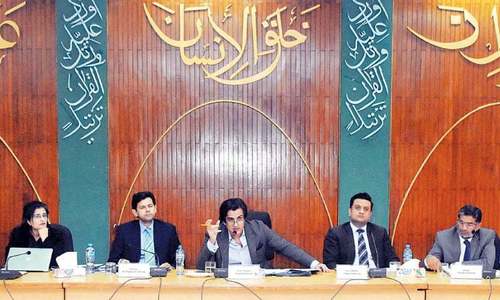ISLAMABAD: Pakistan will take up new projects for Chinese financing and investment to expand the $46 billion China-Pakistan Economic Corridor (CPEC) when officials of the two countries meet here on Nov 6 as part of the Joint Cooperation Committee’s (JCC) annual consultations.
Speaking at a joint news conference along with Energy Minister Omar Ayub Khan, Railway Minister Shaikh Rashid Ahmad and Special Assistant to the Prime Minister on Petroleum Nadeem Babar, Minister for Planning and Development Makhdum Khusro Bakhtyar said that Pakistan for the first time would formally engage with Chinese authorities during the JCC meetings to start negotiations on $9bn Main Railway Line (ML-1) and D.I. Khan to Zhob Motorway project of the CPEC’s western route.
The road project was now the only missing link in the Islamabad to Quetta motorway network which would be completed in about three years, Mr Bakhtyar said.
He said the Karachi Circular Railway (KCR) project would now witness progress as it had been put among the prioritised projects. He said the progress on all these projects suggested that the opposition’s allegations of slowing down the CPEC were incorrect.
The other two ministers and the PM’s special assistant also spoke about their respective projects in minerals, electricity, petroleum exploration and refining sector.
Ministers explain plans to be discussed with Chinese officials during Joint Cooperation Committee’s annual consultations
Mr Bakhtyar said the vice chairman of the National Development and Reform Commission (NDRC) of China would be taken to Gwadar on Nov 4 soon after his arrival for the inauguration of a 300MW power plant.
He said the CPEC had become a key pillar of Pakistan’s economic structure that would be taken to new heights after the upcoming JCC. He parried a question relating to number of additional projects and their estimated costs or the revised size of the CPEC.
In this respect, he said, ML-1 would now become the most important project of the CPEC to replace the obsolete railway track of 1,872km from Karachi to Peshawar. There would be progress in financing commitments on this during the JCC meeting, he added.
On a question whether the internal disagreements among various government stakeholders about cost estimates and various phases of the railway project had been settled, Mr Bakhtyar said the project costs would be finalised after a study to be completed by yet to be appointed international consultant while the sequencing of the project would be made keeping in mind the country’s debt to GDP levels. The project would be completed in about seven years and its completion would in fact contribute to GDP and hence its loan would hopefully maintain the debt-to-GDP ratio, he added.
Mr Bakhtyar said the railway ministry had submitted its feasibility study of the ML-1 project and an international consultant would be engaged while its execution and financing would be discussed during the upcoming JCC. He said there would be a joint (China-Pakistan) committee on financing of the project.
Rolling stock
Shaikh Rashid said the ML-1 project would almost double the railway speed to 160km per hour after the obsolete track of 1861 would be replaced by China. He said the project would include rolling stock and other equipment and generate about 100,000 jobs.
He said Pakistan Railways had cleared 38km area of the KCR, adding that the remaining 5km could not be cleared without full support of the provincial government. He said the federal government was ready to provide alternate land, but the provincial government would have to take responsibility for construction of housing facilities for to-be-displaced persons.
Mr Rashid said the approval of the Gwadar Master Plan would be ‘another deliverable’ of the JCC that would also set the dates for the inauguration of a few special economic/industrial zones. He said investments by Chinese and other investors in these zones had been under discussions during the tenure of the previous government and they would now be further advanced.
The planning minister said during the JCC meetings the two sides would also hold discussions about inclusion of Pakistan Steel Mills and other investments in the steel sector besides housing, mineral development, agriculture and tourism in the CPEC’s Long-Term Plan until 2030.
Energy Minister Omar Ayub said the two sides were jointly undertaking a market survey for increasing the share of power plants on domestic fuels in Pakistan and discussions would be held during the JCC as to the location of renewable energy projects and their evacuation through transmission lines to load centres.
In this context, he said, projects like Mahl Hydropower Project, Azad Pattan Hydro project, a series of hydro projects on the Indus Cascade and Taunsa Hydropower, would be offered to the Chinese side. He said Pakistan was targeting to have 70-80 per cent of its energy needs to be met through domestic sources by 2030 and Chinese companies would be key player in this respect. He said 30pc share each for renewable sources (solar and wind) and hydropower and 10pc each for Thar coal and nuclear energy was being targeted for 2030.
Nadeem Babar said four key areas in the petroleum sector would be presented to the JCC. These include South-North gas pipeline, upgradation of Pakistan Refinery and setting up of new petrochemical complexes besides coal to liquid transformation of Thar deposit to produce diesel.
In addition, a total of 35 fresh exploration blocks were being auctioned before December next year and Chinese investors were also being asked to take benefit of these auctions. He said China was also being requested for investment in development of gas storage as Pakistan had developed a gas network of about 5 billion cubic feet per day that was expected to go up to 7BCFD in about three years.
Published in Dawn, November 2nd, 2019














































